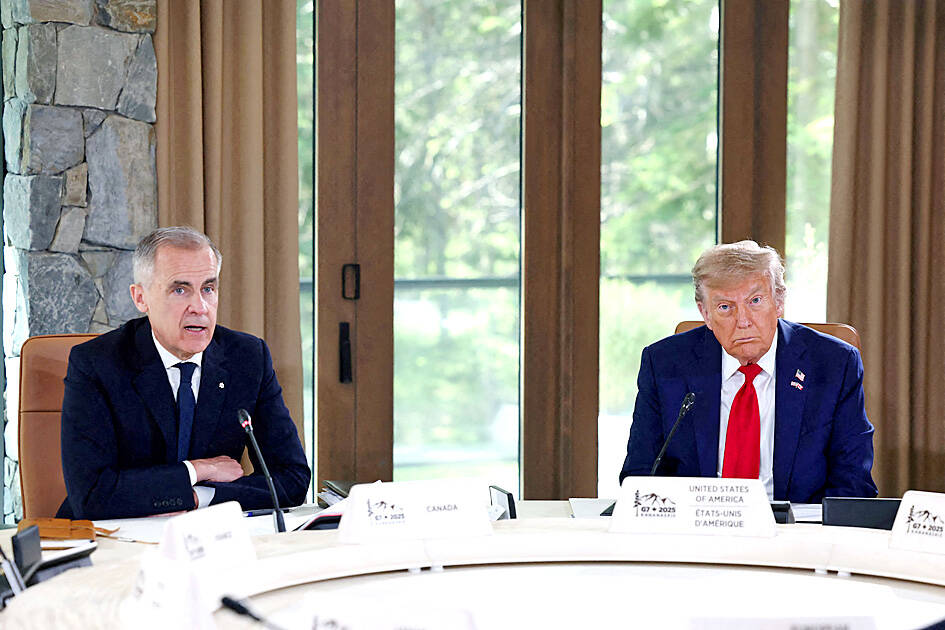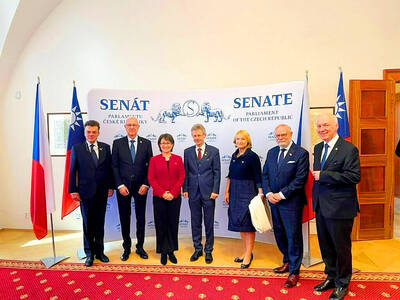Canada has withdrawn its digital services tax (DST) on technology companies such as Meta Platforms Inc and Alphabet Inc in a move to restart trade talks with the US.
“Rescinding the DST will allow the negotiations to make vital progress and reinforce our work to create jobs and build prosperity for all Canadians,” Canadian Minister of Finance Francois-Philippe Champagne wrote on social media late on Sunday.
On Friday afternoon, US President Donald Trump said he was ending all trade discussions with Canada, one of its largest trading partners, in retaliation for the digital tax. He also threatened to impose a fresh tariff rate within a week.

Photo: Reuters
Instead, Trump and Canadian Prime Minister Mark Carney agreed the countries would restart negotiations and try to agree on a deal by July 21. The Canadian dollar strengthened on the news.
For Canada, the economic stakes of those discussions are huge. About three-quarters of its exports go to the US, including the vast majority of its oil and many other commodities, as well as most of the cars and trucks it produces.
However, the US also has something on the line: Canada is the largest buyer of US products. Last year, the US exported about US$440 billion of goods and services to its northern neighbor and imported US$477 billion from it, US government data showed.
The first payment for Canada’s digital tax was supposed to be due yesterday.
The tax, which was passed into law last year by the previous government of former Canadian prime minister Justin Trudeau, was meant to charge 3 percent of the digital services revenue a firm makes from Canadian users above C$20 million (US$14.6 million) in a calendar year.
It would have cost large technology companies billions of dollars. A number of states, including the UK, has such taxes in place.
Instead, Canada would suspend the payments that were due and create legislation to repeal the digital tax entirely, the Canadian Department of Finance said.

FREEDOM OF NAVIGATION: The UK would continue to reinforce ties with Taiwan ‘in a wide range of areas’ as a part of a ‘strong unofficial relationship,’ a paper said The UK plans to conduct more freedom of navigation operations in the Taiwan Strait and the South China Sea, British Secretary of State for Foreign, Commonwealth and Development Affairs David Lammy told the British House of Commons on Tuesday. British Member of Parliament Desmond Swayne said that the Royal Navy’s HMS Spey had passed through the Taiwan Strait “in pursuit of vital international freedom of navigation in the South China Sea.” Swayne asked Lammy whether he agreed that it was “proper and lawful” to do so, and if the UK would continue to carry out similar operations. Lammy replied “yes” to both questions. The

Two US House of Representatives committees yesterday condemned China’s attempt to orchestrate a crash involving Vice President Hsiao Bi-khim’s (蕭美琴) car when she visited the Czech Republic last year as vice president-elect. Czech local media in March last year reported that a Chinese diplomat had run a red light while following Hsiao’s car from the airport, and Czech intelligence last week told local media that Chinese diplomats and agents had also planned to stage a demonstrative car collision. Hsiao on Saturday shared a Reuters news report on the incident through her account on social media platform X and wrote: “I

SHIFT PRIORITIES: The US should first help Taiwan respond to actions China is already taking, instead of focusing too heavily on deterring a large-scale invasion, an expert said US Air Force leaders on Thursday voiced concerns about the Chinese People’s Liberation Army’s (PLA) missile capabilities and its development of a “kill web,” and said that the US Department of Defense’s budget request for next year prioritizes bolstering defenses in the Indo-Pacific region due to the increasing threat posed by China. US experts said that a full-scale Chinese invasion of Taiwan is risky and unlikely, with Beijing more likely to pursue coercive tactics such as political warfare or blockades to achieve its goals. Senior air force and US Space Force leaders, including US Secretary of the Air Force Troy Meink and

Czech officials have confirmed that Chinese agents surveilled Vice President Hsiao Bi-khim (蕭美琴) during her visit to Prague in March 2024 and planned a collision with her car as part of an “unprecedented” provocation by Beijing in Europe. Czech Military Intelligence learned that their Chinese counterparts attempted to create conditions to carry out a demonstrative incident involving Hsiao, which “did not go beyond the preparation stage,” agency director Petr Bartovsky told Czech Radio in a report yesterday. In addition, a Chinese diplomat ran a red light to maintain surveillance of the Taiwanese